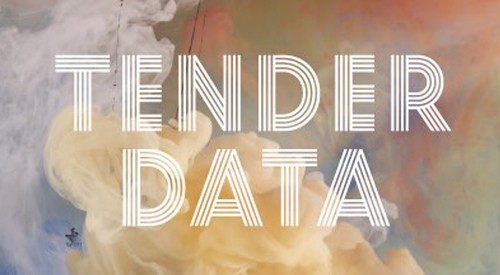Books & Culture
Bursting with Light: Tender Data by Monica McClure

Monica McClure’s Tender Data is an irreverent, glittering show of femininity. McClure’s poetry is confrontational. It’s funny, and sad. It’s grounded in the ins and outs of womanhood and all its absurdity. Words tumble from the mouths of McClure’s speakers in rapid succession: desire, the flexibility of language, and the futility of conception blend easily together in her poems, each bursting with light. Tender Data is a syntactical and thematic delight; even in dark moments, McClure draws our eye to the singular beauty of the human experience.
McClure’s speakers are conflicted, often wanting to chase after life while they simultaneously try to end it. The Plan B pill and abortion are recurring motifs, underscoring her speakers’ trepidations about their own existence. Many of McClure’s women want to be in the world and of it while simultaneously outside of the mainstream. In “Luxe Interiority” the speaker says, “I think I would like to be a part of culture/ while remaining without,” and this sentiment is not unique to one poem. McClure’s women don’t see themselves as being defined by any external labels or descriptors. Though the tone of the poems varies, there’s a consistent disdain for forced meaning.
Tender Data is witty and conversational. McClure’s women are angry, lost, and aggravated. “If someone says poetess,” the speaker of “Flashdancers” tells us, “I am going to scream and chop/ a hobby horse to pieces with an axe.” But the voices in McClure’s poetry don’t just rant; often they point out the difficult dichotomy and untenable existence that is being a woman. In “Beauty School Dropout”, the speaker tells us, hauntingly, “To be a woman is to know how to starve.”
Midway through the book, there is a shift in tone and in language. McClure layers her observations of pop culture and the female experience with challenges to cultural norms. As the poet adds this depth, her poems also increase in length, culminating in prose poetry that’s structurally different — more open and loose — than the short lines of the opening poems. Early in the collection she tells us, “I reject a language manipulated by folklore,” and the progression of McClure’s poetry comes to reveal her dissatisfaction with both form and convention. Tender Data is artfully ordered to demonstrate a kind of thematic unspooling that matches structure, and McClure’s work is bookended by Emily Raw’s photographs of the female form.
“All modes of desire are simulated,” McClure’s speaker tells us in the opening poem, “Blue Angel”. This establishes McClure’s work itself as a simulation of that desire, and whether she’s taking on the full catalog of 2000s pop culture in “Jacking” or building “an altar/ to the saint of lost ephemera,” McClure endows her women with an intoxicating mix of recklessness and sensitivity. Tender Data is strikingly honest, imaginatively assembled, and incredibly accessible. This is the kind of poetry that removes any assumptions of pretense, and thus gets closest to communicating the sloppiness of human sentiment. “I don’t want to be an incubator for meaning,” McClure says, yet her carefully chosen language allows us to feel what we don’t have to interpret.

by Monica Mcclure










